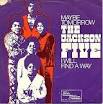This article needs additional citations for verification .(December 2009) |
| "Maybe Tomorrow" | ||||
|---|---|---|---|---|
 | ||||
| Single by the Jackson 5 | ||||
| from the album Maybe Tomorrow | ||||
| B-side | "I Will Find a Way" | |||
| Released | June 22, 1971 | |||
| Recorded | February 1971 | |||
| Studio | The Sound Factory (West Hollywood, California) | |||
| Genre | Pop [1] | |||
| Length | 4:46 | |||
| Label | Motown | |||
| Songwriter | The Corporation | |||
| Producer | The Corporation | |||
| The Jackson 5 singles chronology | ||||
| ||||
"Maybe Tomorrow" is a hit single recorded by American soul family quintet the Jackson 5, in 1971. "Maybe Tomorrow" was included on the Jackson 5's album Maybe Tomorrow, and was also featured on Goin' Back to Indiana . The song was released again in 2009 via a Carl Sturken and Evan Rogers' remix, with an orchestral arrangement by Rob Mounsey, from a compilation album The Remix Suite .
Contents
The song peaked at number 3 on the Billboard Hot R&B Singles chart, and at number 20 on the Billboard Hot 100. [2]
Cash Box said of it that the "group's delightful harmonies and a teasing rhythm section put a sparkling gloss into" the song. [3]